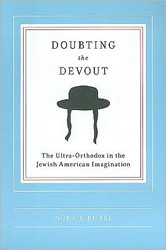The Rabbi Saved by Hitler’s Soldiers was first published ten years ago by Yale University Press as Rescued from the Reich: How One of Hitler’s Soldiers Saved the Lubavitcher Rebbe. The new version is dramatically expanded with additional primary source material and the most recent scholarship. It is a riveting account of the combined efforts of a number of secular American Jews close to the White House and a Mischling Wehrmacht officer who worked together with Nazi diplomats to rescue the Rebbe from Nazi occupied Poland. Bryan Mark Rigg raises the question as to why so many worked so hard to bend American immigration laws in behalf of the Rebbe and his family; why did Ernst Bloch, the Wehrmacht officer, risk his life to bring Rebbe Joseph Isaac Schneersohn, the sixth Lubavitcher Rebbe, to the United States?
One answer Rigg suggests is that the Chabad leadership in the United States was able to convince uninformed rescuers that the Rebbe was the leading Torah scholar in the world and held the same position among the world of Orthodox Judaism as did the pope among Catholics. Among the most effective of those working for the rescue of the Rebbe, was Joseph Rhoade, a secular Jewish lawyer who was enlisted by the Chabad to lobby for the Rebbe’s rescue. Rigg describes his efforts on behalf of the Rebbe as tireless, even at the cost of his other clients, yet the Chabad organization, never remunerated him, despite many promises to do so. In fact, after the Rebbe was rescued, Rhoade, among others who worked to bring him to safety, were never thanked by the Rebbe, nor publicly acknowledged for their efforts.
Rigg’s stinging rebuke of the Rebbe — who, according to the author, was more concerned about bringing his library to the United States than engaging with other Jewish groups to save Jewish lives — is doubtlessly controversial. Of the many criticisms lobbed against the Rebbe and Chabad throughout the book, Rigg’s indictment of the Rebbe’s failure to protest the murder of European Jewry is his fiercest accusation: “America’s screening process in 1940 was flawed, as shown by how the Rebbe and his followers were able to deceive the system. He was saved because government thought his stature among Orthodox Jews was similar to that of the pope[…] which may have been true of his successor but not of him.”
“The Rebbe’s organization claimed in September 1941 that if the Jews were better educated and ‘lived according to the precepts of the Torah, the catastrophic situation would not have developed,’” Rigg writes. “In other words, he believed the Holocaust was God’s punishment for the Jews’ abandonment of their faith. Only renewed obedience to God would end their punishment[…] political action to end the Holocaust or save lives was futile as long as the Jews failed to follow the commandments.” Rigg notes that given this attitude, it was obvious that the Rebbe would find it difficult to cooperate with those involved in the effort to save the Jews of Europe. In short, Rigg argues that there were many things Chabad could have done to help the Jews in Europe other than praying and studying Torah, and Joseph Isaac Schneersohn’s failure to spur the organization to do so remains a black mark on his record as the head of the Chabad during the Holocaust.




